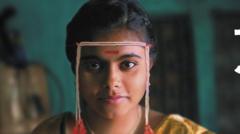The film "Sthal" challenges conventional portrayals of arranged marriages in India by depicting the story of Savita, a young woman fighting against societal norms. With a cast of first-time actors, the film explores themes of dowry, gender roles, and the objectification of women, aiming to ignite meaningful discussions about the issues tied to traditional matchmaking.
Dissecting the Harsh Realities of Arranged Marriages in "Sthal": A Marathi Film's Bold Narrative

Dissecting the Harsh Realities of Arranged Marriages in "Sthal": A Marathi Film's Bold Narrative
"Sthal," a groundbreaking Marathi film, shines a light on the trials faced by women in India's patriarchal society regarding arranged marriages.
In India, arranged marriages dominate the landscape, often leading to a grueling matchmaking process that can resemble an ordeal. This theme resonates powerfully in "Sthal: A Match," a 2023 Marathi-language film that unveils the troublesome realities faced by women during such arrangements. The film, which garnered multiple accolades at festivals across India and beyond, is finally hitting theaters in India this Friday.
Set against the rural backdrop of Maharashtra, "Sthal" tells the poignant story of Savita, a young woman determined to pursue her education and career in an environment defined by patriarchal constraints. Her father, Daulatrao Wandhare, portrayed by first-time actors hired from the local village, embodies the struggle of a poor cotton farmer caught between expectations for his daughter’s marriage and the economic pressures of his profession.
Director Jayant Digambar Somalkar states, "He wants a good price for his crop and a good match for his daughter," highlighting the dual pressures families face. The film stands out for its raw depiction of the humiliation many women endure, a stark contrast to conventional narratives typically celebrated in Bollywood.
The film opens with a scene where Savita, accompanied by her female family members, interviews a potential groom. As the nervous young man serves refreshments, the atmosphere is tinged with levity, quickly shattered when Savita wakes up to reality—a series of male visitors are coming to determine her suitability as a bride. Here, the power dynamics reveal themselves, as Savita is presented like a commodity, sitting before a panel of scrutinizing men. This juxtaposition starkly highlights the often humiliating process that women encounter, something Savita herself experiences firsthand.
The potential grooms engage in discussions that reflect societal bias, critiquing Savita's appearance, while she remains silent and submissive. The gender disparity is evident; recommendations and decisions stem from men, leaving Savita's aspirations and qualifications unheard. This narrative resonates deeply within Indian society, where characteristics like fairness and height are often prioritized over individual merit, illustrating the societal pressure that disproportionately burdens women.
Despite repeated rejection from potential suitors—Savita's despair serves as a mirror reflecting the unfair criteria women face, stemming from older traditions that dictate their value. On her father’s account, the toll that ongoing rejections take on his family is evident.
Savita's journey confronts broader themes of dowry, an issue ingrained in Indian weddings despite being illegal for over six decades. The film underscores the desperation of families struggling to meet exorbitant dowry demands, a practice that perpetuates hardship and can even lead to tragic consequences. The character of Daulatrao lays bare this reality when he contemplates selling his land amidst such pressure.
Somalkar, rooted in his own experiences of the marriage process as a bystander, reflects on how his discomfort led him to tackle this subject matter through film. "I felt uncomfortable when the woman came out in front of the men and was asked questions… it objectified her," he explains. His vision for "Sthal" is clear: to spark conversations around the oppressive norms surrounding arranged marriages, challenging audiences to reflect critically.
"Sthal" stands apart from other cinematic representations of marriage in India, which often glamorize the wedding process. Somalkar emphasizes that getting married should not be the singular life goal for women, advocating for a shift in the narrative that prioritizes education and personal agency above all. "I want to start a debate and encourage people to think about a process that objectifies women," he asserts, hopeful that even a single film can catalyze change.
As "Sthal" makes its much-anticipated theatrical debut, it promises to resonate with audiences by addressing uncomfortable issues within India's matrimonial culture, pushing for evolution in societal values surrounding marriage and women’s rights.



















